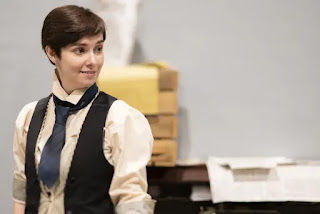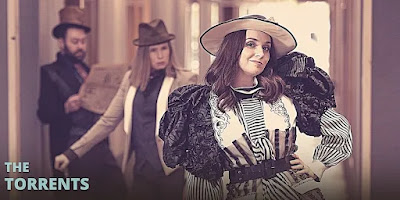The Torrents by Oriel Gray.
Directed by Lexi Sekuless. Designed by Victoria “Fi” Hopkins. Movement direction. Netty Sharpe and Tim Sekuless. Musical Arrangements Leisa Keen. Voice and Acting coach. Sarah Carroll. Lighting designer Stefan Wronski. Sound production Andrew Brown. Prop design Tracy Cui.Production stage manager Zeke Chalmers. Lexi Sekuless Productions supported by Elite Event Technology. Mill Theatre at Dairy Road. Building 3.3. Bookings: humanitix.com/au
Reviewed by Peter Wilkins
 |
| Lexi Sekuless as J.G. Milford in The Torrents |
I first saw Oriel Gray’s play The Torrents in a Sydney Theatre Company production in 2019. The play is about a female journalist arriving to work in the male-dominated office of the local Argus in the late 1890s. This co-production of WA’s Black Swan Theatre and the Sydney Theatre Company in 2019 was only the second professional production of Gray’s prize winning melodrama since its first production at Adelaide’s Playhouse in 1996. I was immediately struck by Gray’s astutely observed eccentricity of her characters in the small gold-mining town of Koolgallah and the forceful conviction of her skilfully crafted dialogue. More than that, I was surprised by the relevance of her arguments and the social issues that she raises as journalist J G Milford confronts the entrenched sexism of a male dominated environment. Milford’s arrival challenges the town’s conservatism when it comes to gender, class, the role of journalism and environmental sustainability and survival in the face of a changing society. I am also surprised to learn that Gray came equal first with Ray Lawler’s Summer of the Seventeenth Doll, and yet it would be another four decades before her play reached the professional stage Perhaps it was because she was a woman or more than that a member of the Australian Communist Party. Perhaps audiences were more attuned to plays about cane cutters, bushmen and male role models . There was little interest in the new woman or the environment.
 |
| Elaine Noon as McDonald. Rachel Howard as Rufus Torrent |
Consequently, this evokes an altered perception of Oriel Gray’s characters but not their circumstances or utterances. The cast play their characters as males and remain true to the intent of Gray’s text. To avoid a perception where credibility could come into question, the key roles of the two women in the cast, J.G.Milford and GwynneThomas, are played by female actors. By casting females in the male roles Sekuless invites audiences to focus on the profound and prophetic nature of Gray’s play. Stefanie Lekkas as Kingsley Myers in Sekuless's production is still attempting to persuade Torrent’s board of directors to invest in an irrigation scheme. Smalley as the son Ben Torrent is still struggling with an inferiority complex in his father’s shadow. Rachel Howard gives an entirely convincing and grounded performance as Argus editor Rufus Torrent. As the printer McDonald Elaine Noon also manages to convincingly and realistically portray her character as a man. Only Helen McFarlane as the office clown verges on caricature. Her portrayal of the tall story telling Christy may conjure impressions of the 1890’s vaudevillian but in the very intimate performance space of the Mill Theatre her overbearing physicality would be more apt on a proscenium mainstage. Heidi Silberman adopts the devious persona of Koolgalla’s slimy businessman but lacks vocal command of her character. By casting female actors in the roles of male characters and playing them as males Sekuless risks disbelief. The cast avoid this pitfall by truthful delivery of character and conversation and I find Gray’s play absorbing and compelling.
 |
| Kat Smally as Ben Torrent in The Torrents |
This, of course, is pure supposition but Lexi Sekuless Production’s inaugural theatrical offering takes risks that may or may not be entirely successful. What is commendable is the establishment of another independent theatre producing works that merit revival as echoed in Julian Meyrick’s recent publication Australia in 50 Plays. Oriel Gray is an important undervalued and relatively unrecognized Australian playwright who laid the way for the female playwrights who emerged after the Seventies. I commend Sekuless and her company for bringing Gray’s significant Australian drama to the stage and for taking risks and embracing challenges to illuminate issues that are as relevant today as they were in fictional Koolgalla and Australia in 1890.
